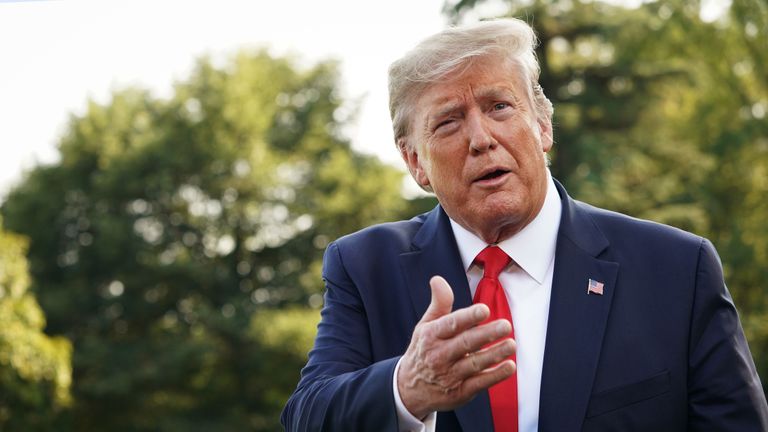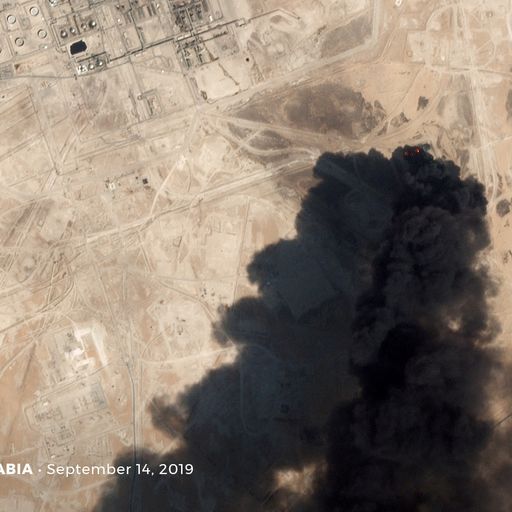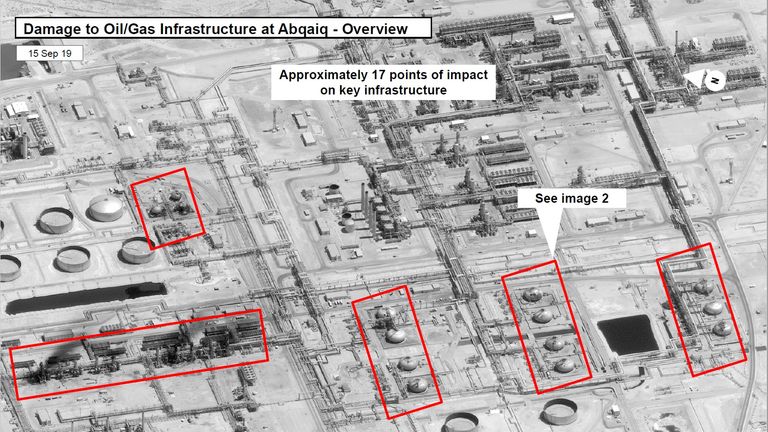Trump cares most about re-election, and voters don't care about Iran
The US president is conflict-cautious because a mistake could damage his chances in next year's election.
Wednesday 18 September 2019 09:38, UK
A day after warning of possible US military action, Donald Trump said on Monday that he would "like to avoid" a conflict with Iran following the weekend's attacks on Saudi oil facilities.
In the same breath that he blamed Tehran, he also insisted: "I know they want to make a deal."
He seems to be keeping a window open for talks with Iran's leadership, too - even though the leadership itself is adamant it will not sit down until sanctions are lifted.
And that, says Trump, ain't happening any time soon.
From sabre-rattling, to tweeted threats, to deference to the energy-rich kingdom of Saudi Arabia, America's position on Iran has been full of mixed messages.
Mr Trump called off a military strike earlier this year because it could have killed too many Iranians and flirted with a plan to offer Tehran a $15bn (£12bn) lifeline to help it deal with the crushing US sanctions.
Central to it all is a president who talks tough, but has also vowed to avoid messy, expensive wars.
In 2016, he promised his supporters he would not repeat the interventionist mistakes of his predecessors.
He plans to do the same for the next election.
He may have spent the last few days declaring America is "locked and loaded", but we have heard that refrain before with North Korea. He didn't act on it then. There is no evidence he will now.
That does not mean there are not more hawkish inclinations and actors within his administration.
Much was made of John Bolton's departure as national security adviser as marking the end of a hard line with Iran.
But the secretary of state, Mike Pompeo, who was said to be at odds with Bolton, has arguably been his ideological twin on Iran.
:: Listen to the Daily podcast on Apple Podcasts, Google Podcasts, Spotify, Spreaker
Could the man who's been tipped as the next Henry Kissinger (with rumours rife of him being tipped to lead both the State Department and the National Security Council) persuade his boss to act?
It seems unlikely he would try.
He's walked a very delicate line with Mr Trump, avoiding any ideological splits. But he has certainly now cowed away from being critical of President Hassan Rouhani and foreign minister Mohammad Javad Zarif, claiming they have no genuine commitment to diplomacy.
The Trump administration is facing one of its most precarious foreign policy challenges to date, with little room for mistake.
This is a region full of factions and long-standing tensions, and a highly sophisticated adversary that seems to be testing a conflict-cautious Trump. It's a hugely complicated crisis requiring deftness, and one misstep could prove catastrophic.
US lawmakers in Congress are on high alert, warning the president that if he does decide to take military action, he'll need to seek their approval first.
The US president, suddenly faced with a new set of circumstances with Iran, has sent Mr Pompeo to Saudi Arabia to discuss the next steps - a plan that appears to open the door to international engagement before deciding what, if any, action to take.
Mr Trump describes Iran as the greatest threat in the Middle East - a would-be nuclear power he's hit with the stiffest sanctions ever applied to a single nation.
He is now caught between confronting Iran to satisfy hawkish Republicans and allies like Israel and Saudi Arabia, and his own political instincts against intervention and towards striking a deal.
He may want to better the work of President Obama by acting big on Iran, but a misfire could easily sink his political chances in 2020 - something he puts above all else.
In three years of travelling across America talking to voters, I have never once heard Tehran at the top of their priority lists.






